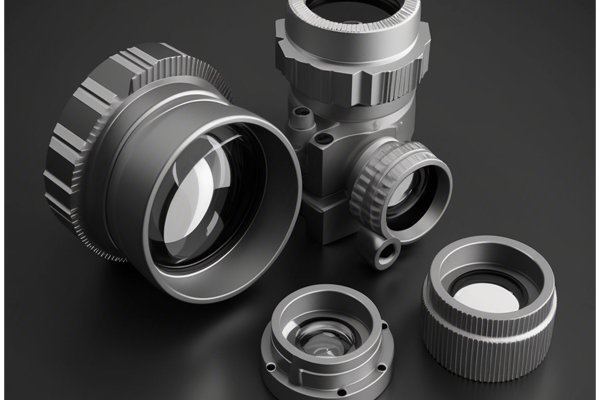Did you know that aluminum is the most widely used non-ferrous metal in the world? With applications ranging from aerospace to automotive and consumer goods to electronics, aluminum’s lightweight properties and corrosion resistance make it a top choice for manufacturers. As industry demands evolve, the precision and efficiency offered by CNC (Computer Numerical Control) machining have led to this technology being adopted on a large scale for custom aluminum parts manufacturing.
In today’s fast-paced manufacturing environment, the ability to produce high-quality components with accuracy and speed is paramount. Whether you’re an engineer looking to develop prototype parts or a large manufacturer needing mass production, understanding the benefits of CNC machining for custom aluminum components is essential. This article aims to explore these benefits in detail, underlining the techniques and processes that make CNC machining an invaluable method in manufacturing tailored aluminum parts.
1.1 What is CNC Machining?
CNC machining refers to the automation of machine tools through computer software. This process entails the use of computerized controls to operate tools that cut and shape materials—such as aluminum—into specified designs and geometries. By using CNC machines, manufacturers can achieve remarkable precision and repeatability, essential for producing custom components.
1.2 The Process of CNC Machining
CNC machining typically involves several key processes:
2.1 Precision and Accuracy
Aluminum parts often need to meet tight tolerances, especially in high-tech industries like aerospace and automotive. CNC machining offers superior precision, minimizing deviations and ensuring high-quality outcomes. The advanced software used in CNC machines allows them to produce parts consistently, which is vital for components that work in conjunction with other pieces.
2.2 Efficiency and Speed
One of the most significant advantages of CNC machining is its efficiency. Automation allows for high production rates, reducing lead times considerably. CNC machines can run continuously, producing multiple parts at once or performing different operations in sequence, which speeds up the manufacturing process.
2.3 Flexibility in Design
CNC machining allows for intricate designs that might be challenging or impossible to achieve with traditional machining methods. Whether it’s complex geometries, contours, or fine details, CNC technology empowers engineers to create customized solutions that are tailored precisely to the client’s needs.
2.4 Cost-Effectiveness for Production
While the initial setup costs for CNC machining can be higher than traditional methods, the long-term savings are undeniable. Due to decreased lead times, reduced waste from inaccuracies, and the capacity for mass production, CNC machining can result in considerable savings over time, especially for custom parts.
2.5 Material Optimization
Aluminum is used for custom parts due to its excellent properties; however, the material is often costly. CNC machining enables manufacturers to utilize material efficiently, reducing waste and ensuring that every part produced is used to its fullest extent. The ability to recycle excess aluminum also contributes to its sustainability.
2.6 Enhanced Manufacturing Processes
CNC machining can integrate multiple processes into one. Components that may typically need separate operations, like milling and turning, can be completed in a single setup, which streamlines production and enhances overall workflow.
CNC machining plays a pivotal role across various industries:
3.1 Aerospace
In aerospace manufacturing, precision is vital. Custom aluminum components manufactured using CNC machining help create lighter, stronger structures necessary for flight safety and fuel efficiency.

3.2 Automotive
The automotive industry continues to evolve with innovations towards increased performance. CNC machining allows for the production of lightweight aluminum components that contribute to improved fuel efficiency and overall vehicle performance.
3.3 Electronics
With the rapid growth of the electronics sector, the demand for custom aluminum housings and components has risen. CNC machining can provide the precision required in manufacturing intricate designs while ensuring thermal conductivity and EMI shielding.
3.4 Medical Devices
In medical applications, there is a need for durable, lightweight components, often with intricate designs. CNC machining ensures the high cleanliness and precision required in the manufacturing of medical parts.
3.5 Consumer Products
With the rise of customizability in consumer products, CNC machining allows manufacturers to create personalized and tailored parts that meet customer’s preferences while ensuring high quality.
While CNC machining offers numerous benefits, some challenges should also be considered:
4.1 Initial Cost
Investing in CNC machinery can be expensive. Companies need to evaluate their production needs and examine if the advantages align with potential return on investment.
4.2 Skill Requirement
Operating CNC machines requires specific skills. Personnel must be trained in programming and operating the machines effectively to leverage their full capabilities.
4.3 Maintenance and Support
CNC machines require regular maintenance to ensure optimal performance. Businesses need a plan for upkeep and possible downtime to minimize disruption in production.
As technology continues to advance, the future of CNC machining looks bright:
5.1 Automation and Robotics
With the advent of automation and robotics, we can expect efficiency and production speed to improve even further. Robotic CNC machines can operate around the clock and take on complex tasks, freeing human operators for strategic decision-making.
5.2 Integration with AI
Artificial intelligence (AI) can enhance CNC operations by predicting maintenance needs, optimizing machining processes, and improving quality control measures. Such integrations can pave the way for smarter manufacturing.
5.3 Environmental Sustainability
As industries push for greener practices, CNC machining can adapt. The ability to recycle aluminum and reduce waste aligns with sustainable manufacturing goals, paving the way for eco-friendly practices.
CNC machining for custom aluminum parts manufacturing is quickly becoming the gold standard in various industries due to its unparalleled precision, efficiency, and capacity for intricate designs. As demonstrated, the technology not only meets the rigorous demands of modern manufacturing but also allows for innovation and sustainability in production practices.
The importance of understanding these benefits cannot be overstated for manufacturers looking to maintain a competitive edge in today’s marketplace. By leveraging CNC machining, companies are better positioned to deliver high-quality, customized solutions that delight their customers while also optimizing their operations.
As we move towards an increasingly complex and technology-driven manufacturing landscape, keeping CNC machining in focus can lead to improved product development, scalability, and ultimately, success in the demanding world of custom aluminum parts manufacturing. So why not consider how CNC machining could transform your production capabilities and equip your business for the future?






